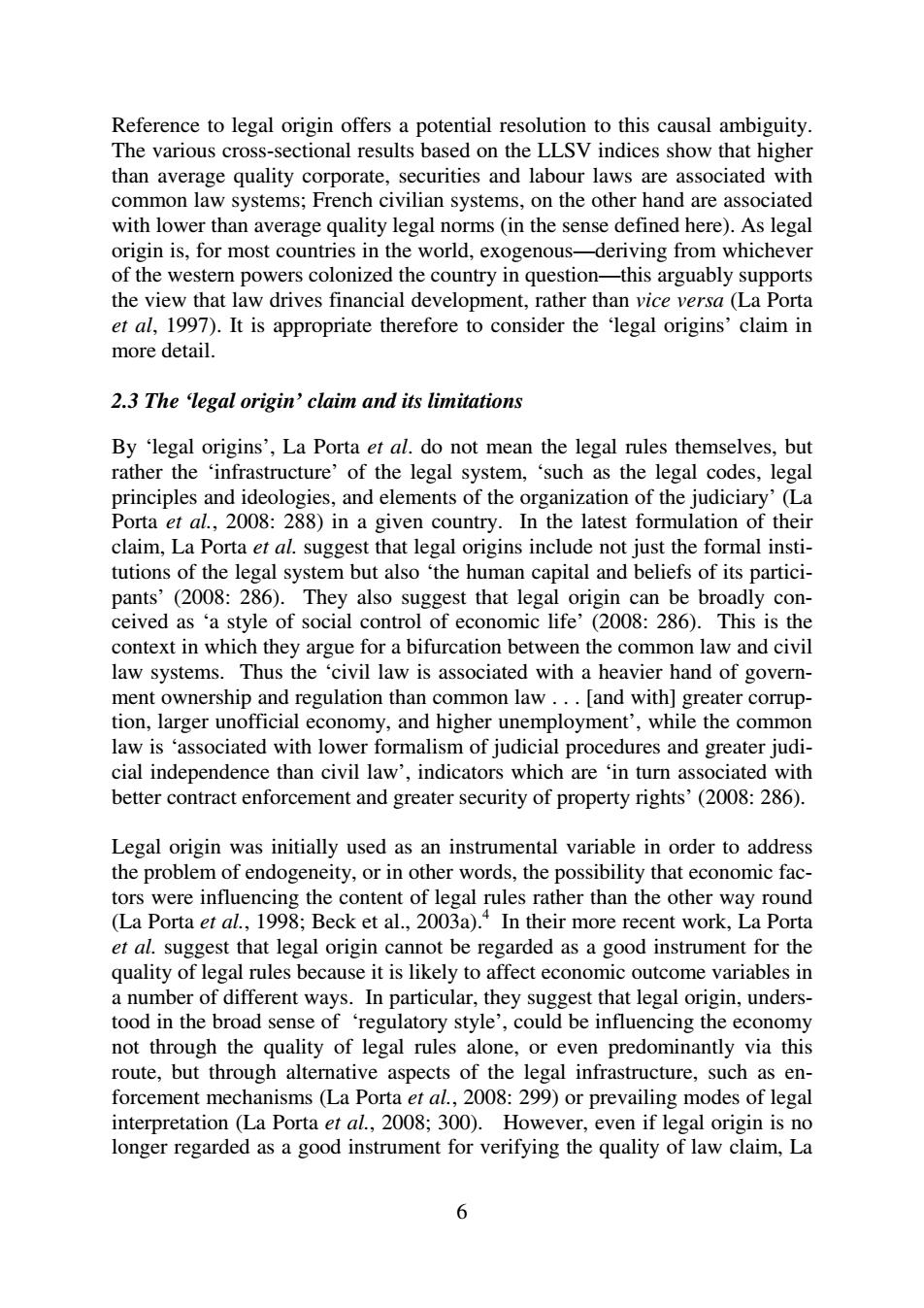正在加载图片...

Reference to legal origin offers a potential resolution to this causal ambiguity The various cross-sectional results based on the LLSV indices show that higher than average quality corporate,securities and labour laws are associated with common law systems;French civilian systems,on the other hand are associated with lower than average quality legal norms(in the sense defined here).As legal origin is,for most countries in the world,exogenous-deriving from whichever of the western powers colonized the country in question-this arguably supports the view that law drives financial development,rather than vice versa (La Porta et al,1997).It is appropriate therefore to consider the 'legal origins'claim in more detail. 2.3 The legal origin'claim and its limitations By 'legal origins',La Porta et al.do not mean the legal rules themselves,but rather the 'infrastructure'of the legal system,'such as the legal codes,legal principles and ideologies,and elements of the organization of the judiciary'(La Porta et al.,2008:288)in a given country.In the latest formulation of their claim,La Porta et al.suggest that legal origins include not just the formal insti- tutions of the legal system but also 'the human capital and beliefs of its partici- pants'(2008:286).They also suggest that legal origin can be broadly con- ceived as 'a style of social control of economic life'(2008:286).This is the context in which they argue for a bifurcation between the common law and civil law systems.Thus the 'civil law is associated with a heavier hand of govern- ment ownership and regulation than common law...[and with]greater corrup- tion,larger unofficial economy,and higher unemployment',while the common law is 'associated with lower formalism of judicial procedures and greater judi- cial independence than civil law',indicators which are 'in turn associated with better contract enforcement and greater security of property rights'(2008:286). Legal origin was initially used as an instrumental variable in order to address the problem of endogeneity,or in other words,the possibility that economic fac- tors were influencing the content of legal rules rather than the other way round (La Porta et al.,1998;Beck et al.,2003a).*In their more recent work,La Porta et al.suggest that legal origin cannot be regarded as a good instrument for the quality of legal rules because it is likely to affect economic outcome variables in a number of different ways.In particular,they suggest that legal origin,unders- tood in the broad sense of 'regulatory style',could be influencing the economy not through the quality of legal rules alone,or even predominantly via this route,but through alternative aspects of the legal infrastructure,such as en- forcement mechanisms (La Porta et al.,2008:299)or prevailing modes of legal interpretation (La Porta et al,2008;300).However,even if legal origin is no longer regarded as a good instrument for verifying the quality of law claim,La 66 Reference to legal origin offers a potential resolution to this causal ambiguity. The various cross-sectional results based on the LLSV indices show that higher than average quality corporate, securities and labour laws are associated with common law systems; French civilian systems, on the other hand are associated with lower than average quality legal norms (in the sense defined here). As legal origin is, for most countries in the world, exogenous—deriving from whichever of the western powers colonized the country in question—this arguably supports the view that law drives financial development, rather than vice versa (La Porta et al, 1997). It is appropriate therefore to consider the ‘legal origins’ claim in more detail. 2.3 The ‘legal origin’ claim and its limitations By ‘legal origins’, La Porta et al. do not mean the legal rules themselves, but rather the ‘infrastructure’ of the legal system, ‘such as the legal codes, legal principles and ideologies, and elements of the organization of the judiciary’ (La Porta et al., 2008: 288) in a given country. In the latest formulation of their claim, La Porta et al. suggest that legal origins include not just the formal institutions of the legal system but also ‘the human capital and beliefs of its participants’ (2008: 286). They also suggest that legal origin can be broadly conceived as ‘a style of social control of economic life’ (2008: 286). This is the context in which they argue for a bifurcation between the common law and civil law systems. Thus the ‘civil law is associated with a heavier hand of government ownership and regulation than common law . . . [and with] greater corruption, larger unofficial economy, and higher unemployment’, while the common law is ‘associated with lower formalism of judicial procedures and greater judicial independence than civil law’, indicators which are ‘in turn associated with better contract enforcement and greater security of property rights’ (2008: 286). Legal origin was initially used as an instrumental variable in order to address the problem of endogeneity, or in other words, the possibility that economic factors were influencing the content of legal rules rather than the other way round (La Porta et al., 1998; Beck et al., 2003a).4 In their more recent work, La Porta et al. suggest that legal origin cannot be regarded as a good instrument for the quality of legal rules because it is likely to affect economic outcome variables in a number of different ways. In particular, they suggest that legal origin, understood in the broad sense of ‘regulatory style’, could be influencing the economy not through the quality of legal rules alone, or even predominantly via this route, but through alternative aspects of the legal infrastructure, such as enforcement mechanisms (La Porta et al., 2008: 299) or prevailing modes of legal interpretation (La Porta et al., 2008; 300). However, even if legal origin is no longer regarded as a good instrument for verifying the quality of law claim, La